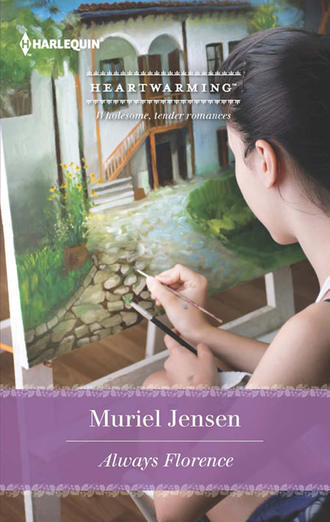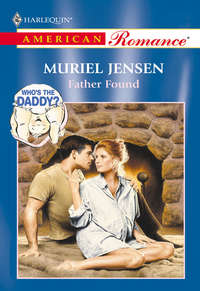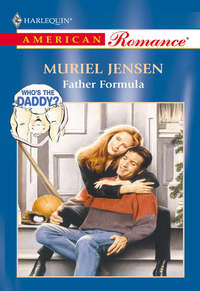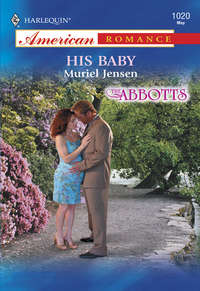
Полная версия
Always Florence
“Sometimes artists make things they think people will like and put them in a gallery—that’s a place where they sell artwork. The artist only gets paid if somebody buys it. And then he or she shares the money with the gallery.”
“Who hired you?” Dylan asked Bobbie.
“A law office in Astoria. A friend of mine from college works there. She showed them something I made for her birthday, and they hired me to do four pieces for their conference room.”
Dylan looked around at the mess. “So, you won’t get paid until this is finished?”
“Right.” She appreciated the distress on his face and felt herself begin to relax a little. “But I know this was an accident. I have one big piece in the house that’s already dry, and I’ve got one piece drying here that seems okay. I’ll do the calligraphy on those while I’m getting more pulp ready. It’ll work out all right.”
“Calligraphy?”
“It’s like painting words, only you do it with a pen with special tips instead of a brush.”
“Well, we’re going to help you clean this up.” Nate pushed up the sleeves of his plain gray sweatshirt. “Come on, guys.” He pointed the dog to a spot on the lawn. “Stay, Arnold.” He turned to Bobbie, all business. “Where’s your garbage can?”
“You don’t have to clean up. I...”
He wasn’t listening. He went to the side of the garage, then peered inside and saw the can at the back. He stepped carefully over the rubble and carried the can out to the grass. “You separate what has to go from what can be fixed. We can replace that shelving for you.”
She got down on her knees and began to sort through the broken earthenware pots and saucers, the rusty tools, the old army blankets she used for her paper press. “Thanks, but I can put up new shelves. Most artists worth the name are carpenters, too. Otherwise we spend a fortune on stretchers and frames.”
“But you didn’t break it, so you shouldn’t have to fix it. And Dylan’s pretty good.”
As his uncle began tossing into the can the things she put aside, Dylan looked surprised, then pleased by the compliment. But his pleasure showed for only a moment. He bent over the broken shelf. “We have boards left from a bookshelf we made for Uncle Nate’s room.” He turned to him. “Can we use those?”
“Go ahead,” Nate said. He looked Dylan in the eye. “Nothing fancy, okay? No power tools. Those boards should be just the right size, but measure them against the old one. If anything needs cutting, call me.”
Dylan picked up two pieces of a broken shelf and headed off to the basement entrance at the side of their house.
Bobbie wondered if trusting the boy to do as he was told might be a stretch after what she’d experienced, but she was sure his uncle knew the risk. He watched Dylan head off, mild concern pleating the spot between his eyebrows.
“You can go with him,” she suggested as she dropped a rag into the can. “Sheamus and I can take care of this.”
Nate shook his head. “No. Dylan would hate that. I put the power saw away after he cut my workbench in two on his last unapproved project, so he’ll be okay.” He turned his attention to Sheamus and nudged him with his elbow. “I’m not finding any kid feet, are you?”
Bobbie reached for the broom and turned, certain she’d misheard them. “What? Kid feet?”
Sheamus looked into the pot of now brown, mucky pulp, then smiled up at her. “Dylan told me you were a witch and that you were making a... I forgot the word. It’s the stuff that a witch has in her big pot and it makes explosions and lightning and loud noises.”
“A potion?” Bobbie guessed.
“Yeah. And he said you put bats and bugs and parts of little kids in it.”
Bobbie was aghast. She hadn’t spent that much time with children, except for the few she’d met when she had her treatments, and they were, sadly, very adult. She was startled by what went on in the minds of little boys.
“I promise I’m not a witch,” she told Sheamus seriously. “That was probably pretty scary for you to think that.”
He shrugged a small shoulder. “Dylan said you wouldn’t take me, because only brave kids would work.”
She saw his uncle straighten up from the trash can and frown. “You ran to get help when you thought your brother was in trouble,” he said, patting the little boy’s head. “That was brave. Come on and help me clean off this table. Grab that brush and dustpan.” He pointed to the ancient set propped in a corner that had been in the garage when she moved in.
After salvaging what she could, Bobbie went inside and put half the brownies she’d made that morning into a freezer bag, and took it out to Nate and Sheamus. They were placing the lid on the trash can. The garage floor was remarkably clean. Nate carried the can back to where he’d found it.
“What do you want to do with the ruined pulp?” he asked, peering into the pot. All kinds of dust, shavings and debris were now mixed in its murky contents.
“I’ve got an old plastic bucket with a lid.” She pointed to a shelf above the oil tank. Nate reached up to bring it down. “If you can pour it into that and put the lid on, I’ll keep it for later. It might still be useful for something.”
Sheamus helped him replace the lid, then he put it in a corner, out of the way.
“Thank you for cleaning up,” she said, handing Sheamus the bag.
The boy looked thrilled. “Brownies!” Arnold sniffed interestedly.
Nate dusted his hands on his jeans and thanked her. “Brownies are something all of us agree on. But I’m not sure you should be giving gifts to the kids who caused the damage.”
He’s gorgeous, she thought with the comfortable distance of a woman who didn’t really care. Now that much of the mess was cleaned up and she felt calmer, she could observe him with detached interest. Tall, lean, hazel eyes with stubby lashes, nice nose, Saturday morning stubble around a straight mouth that was a little tight. He didn’t smile much. She was willing to bet he had a dynamite smile when he used it.
She wondered what had happened that his nephews were living with him. He seemed to be good with them, though she sensed an undercurrent of antagonism with the older boy.
She could list Nate Raleigh’s qualities without a stirring of feminine interest because she had a life plan that didn’t involve a husband and children. She was going to Florence, Italy, to study art. It had been a dream since she was sixteen, and the last year had made it an obsession. She was in remission, but she didn’t have forever. Follicular non-Hodgkin’s lymphoma was less aggressive than the B-cell form, but it was a lifelong disease. She had to go now. The need to make art lived inside her like the creature in Alien, and was always trying to break out. She had to go to the birthplace of classical European art. She wanted to study and learn, to find the depths of her talent.
She offered her hand again. “I’m happy to share. It was nice to meet all of you.”
“Again, we apologize for destroying your work.” He shook her hand. “We’ll bring the shelves over soon. Is there anything else we can do before we go?”
“No, I’m good.”
“I’m glad you didn’t have kid feet in there,” Sheamus said.
She pinched his chin. “Me, too. They would have looked awful sticking out of my paper.”
Sheamus laughed infectiously.
Bobbie watched them walk across the yard to the big yellow Craftsman-style house next door, the man and the boy hand in hand, the dog lumbering along beside them. She smiled at the sight.
Nice, but not for her.
CHAPTER TWO
NATE LOOKED THROUGH the rack of Halloween costumes, spotted the bright red and blue, and triumphantly pulled out Spider-Man. They’d been to four stores, found Dylan’s Iron Man right away, but had been searching all afternoon for Sheamus’s choice. Everyone was now tired and grumpy.
Certain this find would change the mood, Nate was surprised when he held up the costume and turned around, only to discover Sheamus close to tears—again. Nate drew a breath for patience.
“I thought you wanted to be Spider-Man.”
“I want the one with the muscles.” Nate looked to Dylan for help. Dylan, holding the bag with his own costume in a death grip, reached up to a shelf of masks for a skull with a rubber snake crawling out of the mouth. “Would you lend me a hand here, please? What is Sheamus talking about?”
Dylan rolled his eyes, clearly disdainful of his uncle’s ignorance. “Some of the superhero costumes have built-in muscles. They’re more expensive.”
“Built-in muscles,” Nate repeated under his breath. What he needed was built-in patience and endurance.
A smiling older clerk gave him a sympathetic look. “Musclemen are over there.” She pointed to a long rack across the floor. A half dozen parents and children were rummaging through it.
Sheamus ran in that direction. Dylan shook his head. “He’s not going to be able to reach it. Then he’ll start crying again.”
“Why don’t you go help him,” Nate suggested, nerves frayed after the grueling afternoon, “instead of making fun of him?”
“Because he’s such a baby!”
Nate directed him toward Sheamus, who was already being pushed aside by older kids. “You find things hard sometimes, and he’s a lot younger than you are. You should try giving him a hand rather than telling him the neighbor is a witch who collects body parts of little kids.”
“Who’d believe that, anyway?”
“He’s seven, Dylan. And he’s scared.”
“So? Isn’t everybody scared?”
The profound question stopped Nate in his tracks, but the frantic shoving going on at the rack precluded a discussion. And Dylan had already wandered away, looking as though he regretted that admission.
Nate spotted all the red-and-blue costumes hung together, and reached for a small one at the same moment that a beautiful, pregnant young woman did. Prepared to fight her for it no matter how bad it made him look, he was relieved when she grasped another size instead. He yanked the small outfit off the rack and got down on one knee to hold it up against Sheamus. Stitched to create the appearance of muscles across the torso and along the arms, the costume brought a smile to the boy’s face. Sheamus wrapped his arms around Nate’s neck. “Thanks, Uncle Nate! We got it!”
“Great. Now we have to get candy for the trick-or-treaters.”
“How can we give out candy?” Dylan asked. “Aren’t we going to be at the Monster Bash?”
“Stella’s going to stay until we get back,” he said.
Nate cringed inwardly at the thought of the event. The city-sponsored Halloween celebration held in a Parks and Recreation building was intended to keep children safe while letting them enjoy a ghoulish experience. He heard it was an ordeal for parents, who often commiserated with each other about having to go.
There was a brief discussion over the merits of mini chocolate bars, small boxes of licorice and sour candy. Nate bought several bags of each.
“Can we get something to drink?” Dylan asked at the checkout. “I’m thirsty.”
“Sure.” Nate pictured a tall gin and tonic, but led the boys to the Starbucks on the other side of the store. “We shoulda brought the brownies with us,” Sheamus said on the drive home. “They would taste good with this.”
Nate found the boy’s reflection in the rearview mirror. Sheamus drew on the straw of his smoothie so hard that his thin cheeks sucked in. “We can have them for dessert tonight. Stella left us mac and cheese for dinner.”
Dylan grumbled. “She’s a really good cook, but I like the mac and cheese in the box better.” Then he asked seriously and without warning, “Do you think Bobbie had cancer?”
His older nephew’s out-of-the-blue observations never failed to surprise Nate. Mostly because they were usually on target.
“Her hair looks like a man’s. And she looks kind of like she has a bad cold. You know what I mean?”
Nate knew exactly what Dylan meant. Their neighbor had beautiful eyes, but they were a little soupy, as though she wasn’t quite well. And he, too, had wondered about her hair.
“Yes, I do. But we shouldn’t mention it unless she does.”
“She’s kind of skinny,” Sheamus contributed. “But I like her. We should have her over for dinner sometime. When Stella makes that Mexican stuff with the chicken and the corn chips.”
“Mexican chicken casserole.” Nate nodded. “I like that, too. But Bobbie has a lot of work to do. Especially after what happened today.” He let that hang in the air a moment for guilt effect. It was probably bad parenting, but he was just an ignorant bachelor pressed into service.
“She could come on game night,” Dylan suggested. Nate studied the boy, wondering why his nephew suddenly seemed keen on the woman. Could it have been the brownies? “When Hunter comes over to watch our big TV.”
Hunter had lost his own accounting business when his office manager embezzled from him, then disappeared. Hunter had liquidated all his assets to pay creditors and his employees, then moved into the Grand Apartments with a few pieces of furniture he’d saved, and an old television he’d bought at Goodwill. He loved coming over to watch big games and play-offs on Nate’s plasma TV.
“We’ll see how it goes.” Their neighbor had kindly given them brownies, but he couldn’t imagine she’d want any more to do with them.
“I don’t think she has a husband.” That was from Sheamus, who thought Nate needed a wife. Nate had explained over and over that he had more than he could handle with the two of them and the business, but the boys’ mother had been a wonderful, warm, funny woman, and Sheamus was trying hard to put those qualities back into his life. He didn’t realize that not all women were like Sherrie.
“I didn’t see a ring.” That was from Dylan, who enjoyed stirring things up.
“She could have a boyfriend.” Nate paused to sip at his coffee and thought longingly of that gin and tonic. “There’s no way of knowing that.”
“If she isn’t married to him,” Dylan said, “it doesn’t matter. She’s still available.”
“That’s a big word.”
“I’m a smart kid.”
“I don’t know. A smart kid would stop annoying me by trying to get me married off.”
Dylan met his eyes in the mirror, smiled grudgingly and the subject was dropped.
Nate pulled into their driveway, congratulating himself on a day that had turned out better than it had begun. He’d made peace with their neighbor, found the right costume for Sheamus and had a conversation with the boys that hadn’t ended in tears or with Dylan stomping away.
And they had brownies. All in all, a successful afternoon.
* * *
BOBBIE DUNKED AN English Breakfast tea bag into the hot water in her favorite pink mug and picked up her ringing phone. The caller ID read Molloy, D. J. She prepared herself to lie through her teeth.
“Hi, Dad!” she said cheerfully, carrying her tea to the kitchen table and sitting down. Monet leaped onto the table and rubbed against her face. He smelled of fabric softener. He’d been sleeping on top of the dryer again. She pulled him onto her lap. “How are you doing? How’s the arthritis?”
“Under control.” His voice was deep and gentle. It had soothed many a patient in his long career as a general practitioner. He was retired now, and Bobbie’s health had become his focus. “I’m taking my glucosamine chondroitin and getting my exercise. How are you? Still thinking the move to Astoria was a good idea?”
When she’d left Los Angeles to come here, she’d had a hard time convincing him she’d be fine on her own. He’d watched over her treatment, moved in with her to manage her recovery, and hovered over her with suggestions about diet and exercise until she knew she had to get away. Not just for herself, but for the single women in Whittier, California, who were interested in him but had taken a backseat to his daughter’s illness and recovery. Bobbie wanted him to reconnect with his own life so that she could go to Florence with a clear conscience.
The commission from Sandy Evans’s office had come at the perfect moment. Bobbie could have completed it in Whittier, but the lease was up on her apartment and she didn’t want to sign another one, or move in with her father. When she’d explained her predicament to Sandy, her friend had offered her the monthly rental of this tiny two-bedroom in Astoria that she’d inherited from her aunt. The selling point had been the two-car garage that Bobbie used as a studio for messy papermaking.
“I love it here,” she said. That was true. The hilly old neighborhoods with their turn-of-the-twentieth-century homes were wonderful for walking, collecting leaves and flower petals, and enjoying beautiful vistas. Even in tightly built areas there was the occasional empty lot where she could see the broad Columbia River and the Washington hills on the other side. “I walk all the time and the air smells of wood smoke and pine.”
“Mmm. That sounds heavenly.”
Encouraged by his approval, she went on, stroking the cat as she talked. “Sometimes, on the river walk, which is this wonderful paved strip that runs a couple of miles right along the water, you get a whiff of fish and diesel because of the fishing boats, but I’ve come to love that, too. It’s a very lively, working waterfront.”
“Are you getting acquainted with anyone? You’re not just spending all your time working in your studio and walking alone, are you?”
“I am meeting people,” she fibbed. “Of course, I have to spend a lot of time on the commission, but Sandy has introduced me to her friends.” Bobbie hesitated a moment. That was a big lie. Sandy was a single mother with two little girls and a full-time job. She was always working for one worthy project or another, and barely had time to go to the bathroom, much less party with friends. But Bobbie’s father must have lost the lie-detector skills he’d had when she was in high school, so she forged on. “And just today, I met my neighbors. Well, I’ve seen them come and go, but there hasn’t really been time to talk until this morning, when Nate and the boys came over.”
“And his wife?”
“Nate’s a single dad. Well, an uncle, actually, and I’m not sure what happened, but his two nephews live with him.”
“Really.”
She heard it in her dad’s voice. Speculation on the possibilities.
“I’m not getting married, Dad,” she stated quickly, firmly. “I explained it all to you. A couple of times, as I recall. I’m going to Florence in January.”
“Did I say anything?” He sounded innocent and a little injured.
“You didn’t have to. I can read it in your voice.”
“Hmm. New skills acquired through chemotherapy, no doubt. Because in the past, you’ve always heard my voice, but I’ve never noticed that you listened to it.”
“Ha, ha. Very cute. I’ll be thirty in February. It’s time I did what I was born to do.”
“We’re born to love and be loved,” he said gently.
She agreed. “We are, but I love Michelangelo, Tintoretto, Monet, Renoir, Giacometti.... And when I see their work, it’s as though they love me back.”
She heard her dad draw a breath, and knew he wanted to take issue with that, but he changed the subject instead.
“I’m coming to see you,” he announced abruptly.
Oh, God, no. It had been hard enough to pull away from him once—for him and for her. It would be awful to have to do it again.
“I thought you were going to come and visit when I get to Florence.” Her voice sounded high and a little strained. At least that way she’d have made it to Italy.
“Well, I want to visit you there, too. But I thought we should spend Thanksgiving together. I know it’d be too hard for you to come here, so I’ll come up there. I got a new van, did I tell you that? Actually, it’s new to me but a couple of years old. I can throw all my stuff in the back, a sleeping bag, and be gone at a moment’s notice.”
“No, you didn’t tell me. And...wow.” Her attempt at excitement fell a little short.
“You don’t mind, do you?”
“Of course not.” She answered quickly, decisively. She couldn’t hurt his feelings. The cat looked up at her, as though sensing her ambivalence. “It’ll be fun. When will you be here?”
“How about the Monday or Tuesday before Thanksgiving?”
“Perfect.” She just had to make sure her commission was completed so she could show him around. She could do this.
“Great.” She could hear the smile in his voice and was glad she’d made him happy. Then he added with a sudden burst of speed, “I’ll stay through Christmas, then we can say goodbye.”
She closed her eyes and pressed her lips together to prevent anything he wouldn’t want to hear from coming out. Through Christmas? He’d done that deliberately. He’d been a very astute father and he’d always read her like a book. He knew she wanted to be on her own to prepare herself for Florence. Leaving family and friends behind was difficult, but she was desperate to do this, so she’d started with the move to Astoria. And now he was doing his best to foil her plans.
He didn’t want her to go. He’d been clear about that more than once. He considered her still too delicate to be on her own in a foreign country with what some considered less sophisticated medical options. Or—she had to face this—he was afraid she’d die there and he’d never see her again.
But she felt sure she had time. She didn’t have forever, but she wanted to spend all the time she did have stretching the artist in her to the furthest reaches of her talent. And she couldn’t do that with her father’s arms around her. Or a husband’s.
She ramped up the cheer in her voice. “That’ll be fun, Dad. I’ll love showing you around. This is the most beautiful place, everywhere you look.”
He expelled a breath. Relief, she guessed. “Good. Good, Bobbie. I’ll see you in about a month.”
“Okay, Dad.”
“Okay. I love you, baby.”
“Love you, too, Dad. See you soon.”
“Bye.”
She turned off the phone and growled and stamped her foot. Monet jumped down and meowed in protest. Bobbie stroked him with the sole of her shoe. She wanted to cry, but she didn’t let herself do that anymore. It was a waste of energy and she had too much to do.
She could do this. She could walk into her father’s embrace one more time and be able to let him go at the end of it. She just hoped he could do the same.
She sipped at her tea and carried the cup to the second bedroom, where she had a drafting table and her paints and inks. She put her cup safely out of the way and leaned over the piece she was working on. A quote from Oliver Wendell Holmes about dying with one’s music unsung was partially complete. It was going well. She wouldn’t say that aloud, of course, because it had a way of jinxing a project, but she could admit to being happy with her progress.
She had just pulled her stool into position when there was a rhythmic knock on the front door. Sandy. “Come in!” Bobbie shouted.
Tall and red-haired and just a little plump, Sandy Evans breezed into the room in jeans and a short, pumpkin-colored jacket. Her two little girls, Adalyn—Addie—and Zoey, were with her. Three and four respectively, they were fair-haired like the father, who’d walked away after Addie was born, claiming to be overwhelmed.
Sandy didn’t know what the word meant. She worked full-time as an office manager, was completely devoted to her daughters and still found time for community involvement. She made Bobbie feel like a slug.
She dropped a white paper bag on Bobbie’s table, then came around to look over her shoulder at the artwork. She was distracted for an instant when Zoey reached out to touch a jar of paintbrushes. “Hands in your pockets, girls,” she said. “No touching. This is all important stuff to Aunt Bobbie, and we don’t want to break anything.”
Leaning over Bobbie’s shoulder, she breathed an “Oh!” of approval. “That’s going to be gorgeous!” She pointed a pumpkin-painted fingernail at a pale blue flower petal in the paper. “What is that?”
“I dried hydrangea, and took one of the petals.” She indicated another spot. “That’s a hawthorn leaf. And that longer yellow petal is from a forsythia I saved from the spring.”









